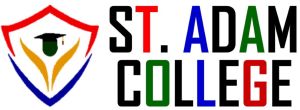Tomorrows Business Leaders
The field of international development is constantly changing. Professionals trying to keep up in this dynamic career, whether they are just starting out or a seasoned pro, need to be lifelong learners. The initiative Skills for Tomorrow is committed to assisting you in keeping up with the most recent developments affecting vocations and exploring the numerous upskilling options available to you, including traditional degree programs, online certificates, and practical experience.

Take some time to look around the website to learn what successful developers need to know and how to acquire it.
Build Your Future With ST Adam College
A career plan lists short- and long-term career goals and the actions you can take to achieve them. Career plans can help you make decisions about what classes to take, and identify the extracurricular activities, research, and internships that will make you a strong job candidate. Below are some helpful steps to guide you in creating a career plan customized to your interests and ambitions.
- Specific — Identify your goal clearly and specifically.
- Measurable — Include clear criteria to determine progress and accomplishment.
- Attainable — The goal should have a 50 percent or greater chance of success.
- Relevant — The goal is important and relevant to you.
- Time-bound — Commit to a specific timeframe.
We can help you enable the latest and greatest features and help your organization adopt the upgraded system.
- Feature review and recommendations on what to implement
- Feature-based implementation project plans
- We’ll implement the features for you
- We’ll teach you how to maintain the features
This qualification reflects the role of individuals who apply project management skills and knowledge. They may manage projects in a variety of contexts, across a number of industry sectors. They have project leadership and management roles and are responsible for achieving project objectives. They possess a sound theoretical knowledge base and use a range of specialised, technical, and managerial competencies to initiate, plan, execute, and evaluate their own work and/or the work of others.
Customized For Quick Learning
We receive many inquiries from industry, governments, and regional associations interested in tailoring a STAC education to their organization. We work with these organizations to assess their needs and determine the right fit within a framework of faculty areas of expertise. We can design programs to be delivered online, on campus, on-site, or via a blend of modalities.
We reach out to the appropriate STAC faculty when designing a custom program. Faculty can be involved in several ways to deliver STAC content:
- Academic Director: helps design and deliver the academic content
- Course instructors: teach courses within the program
- Industry liaisons: connect us with organizations interested in customized learning and work with industry guest speakers and instructors
If you have an idea for new learning solutions for your industry collaborators, our team can assess industry interest and market potential to determine the viability of custom programs. We are also always happy to connect with your industry contacts to discuss how we might be of service to their organization.
Build Your Future With ST Adam College
Needs certified craft professionals with technical skills who can keep it growing. Finding a career in construction is a life-changing decision to fulfill important roles in building communities. STAC helps in discovering how construction can be a good fit for your future — from making the right preparations to finding training. Skilled craft professionals are always in demand, and employers need them now more than ever. With endless possibilities, opportunities for career advancement, and lucrative positions available, there has never been a better time to start a career in construction.
| Business & Management | Engineering & Technology | Community & Health | Hospitality | Finances & Real Estate |
| CSD1BB Business | CSD2AS Automotive Services Technology | CSD3CC Children Care | CSD1RS Retail Services | CSD1CN Construction |
| CSD2BB Business | CSD2AS Automotive Steering and Suspension Systems | CSD5CC Children Care | CSD2RS Retail Services | CSD2CN Construction |
| CSD3BB Business | CSD3LV Light Vehicle Mechanical Technology | CSD3AC Aged Care | CSD3RS Retail Services | CSD4BC Building & Construction (Build) |
| CSD4BB Business | CSD3AD Automotive Diesel Fuel Technology | CSD3DY Disability | CSD4RS Retail Services | CSD4BC Building & Construction (Admin) |
| CSD5BB Business | CSD3AE Automative Engine Reconditioning | CSD3HC Home Care | CSD5RS Retail Services | CSD4BC Building & Construction (Site Man) |
| CSD6BB Business | CSD3HV Havey Commerical Trailer Technology | CSD4AC Aged Care | CSD1HY Hospitality | CSD3BL Bricklaying & Blocklaying |
| CSD2CS Customer Services | CSD3AO Automotive Mechanical Overhauling | CSD4DY Disability | CSD2HY Hospitality | CSD3CP Carpentry |
| CSD3CS Customer Services | CSD1EN Engineering | CSD2CM Community Services | CSD3HY Hospitality | CSD3CN Concreting |
| CSD4CS Customer Services | CSD2EN Engineering | CSD3CM Community Services | CSD4HY Hospitality | CSD2FS Financial Services |
| CSD5CS Customer Services | CSD3EN Engineering (Mechanical) | CSD4CM Community Services | CSD5HY Hospitality | CSD3FS Financial Services |
| CSD3BA Business Administration | CSD3EN Engineering (Fabrication) | CSD5CM Community Services | CSD6HY Hospitality | CSD4FS Financial Services |
| CSD3BA Business Administration (Education) | CSD4EN Engineering | CSD5CO Counselling | CSD2TM Tourism | CSD4BK Banking |
| CSD4LM Leadership & Management | CSD1IT Information Technology | CSD2CO Cleaning Operations | CSD3TM Tourism | CSD2IO Infrastructure Operations |
| CSD4AD Advertising | CSD2IT Information Technology | CSD3CO Cleaning Operations | CSD4TM Tourism | CSD1IO Infrastructure Operations |
| CSD5AD Advertising | CSD3IT Information Technology | CSD1SO Security Operations | CSD5TM Tourism | CSD2CC Civil Construction |
| CSD4SB Small Business Management | CSD4IT Information Technology | CSD2SO Security Operations | CSD6TM Tourism | CSD3CC Civil Construction |
| CSD4BS Business Sales | CSD5IT Information Technology | CSD3SO Security Operations | CSD3ET Event | CSD3CC Civil Construction (Plant) |
| CSD4BA Business Administration | CSD4SO Security Operations & Risk Management | CSD4ET Event | CSD4CC Civil Construction | |
| CSD5BA Business Administration | CSD2HS Health Support Services | CSD5ET Event | CSD2WO Warehousing Operations | |
| CSD4FM Frontline Management | CSD3HS Health Administration | CSD3CC Commercial Cookery | CSD2LG Logistics | |
| CDS4HR Human Resources Management | CSD3AH Allied Health Assistance | CSD4CC Commercial Cookery | CSD3LG Logistics | |
| CDS5HR Human Resources Management | CSD3HA Health Services Assistance | CSD3WS Work Health and Safety | ||
| CSD4MR Marketing | CSD4HS Health Administration | CSD4WS Work Health and Safety | ||
| CSD5MR Marketing | CSD1AN Animal Studies | CSD5WS Work Health and Safety | ||
| CSD6MR Marketing | CSD2AN Animal Studies | |||
| CSD4PU Purchasing | CSD3AN Animal Studies | |||
| CSD4PM Project Management | ||||
| CSD5PM Project Management | ||||
| CSD5LM Leadership & Management | ||||
| CSD6HR Human Resources Management | ||||
| CSD6LM Leadership & Management |
Up To Date Curriculum
Global megatrends such as the rising role of technology, climate change, demographic shifts, urbanization, and the globalization of value chains are changing the nature of work and skills demands. To succeed in the 21st-century labor market, one needs a comprehensive skill set composed of:
- Cognitive skills, which encompass the ability to understand complex ideas, adapt effectively to the environment, learn from experience, and reason. Foundational literacy and numeracy as well as creativity, critical thinking, and problem-solving are cognitive skills.
- Socio-emotional skills, which describe the ability to navigate interpersonal and social situations effectively, and include leadership, teamwork, self-control, and grit.
- Technical skills, which refer to the acquired knowledge, expertise, and interactions needed to perform a specific task, including the mastery of required materials, tools, or technologies.
- Digital skills, which are cross-cutting and draw on all of the above skills, describe the ability to access, manage, understand, integrate, communicate, evaluate, and create information safely and appropriately.

The development of skills can contribute to structural transformation and economic growth by enhancing employability and labor productivity and helping countries to become more competitive. Investment in a high-quality workforce can create a virtuous cycle, where relevant and quality skills enable productivity growth and foreign direct investment, which result in more and better jobs for the current workforce and more public and private investment in the education and training system. This, in turn, increases the employability and productivity of both the current and future workforce.
The above conceptual framework has been applied through the first-ever initiative to measure skills in low- and middle-income countries, the STEP Skills Measurement program. Using household-based and employer-based surveys facilitates the collection of policy-relevant data to enable a better understanding of skill requirements in the labor market, backward linkages between skills acquisition and educational achievement, personality, and social background, and forward linkages between skills acquisition and living standards, reductions in inequality and poverty, social inclusion, and economic growth.
Industry Leading Skills
Becoming a manager is only a part of becoming a leader. It involves leading others in good times and bad, as well as having the capacity to console them when they are extremely anxious or confused. This is sometimes more difficult than it appears to be and is easier said than done. But it is undoubtedly doable. In the same way that managers come in diverse sizes and forms throughout a wide range of industries, so too may leaders. My talents have been developed over a wide range of businesses, including audits, healthcare, commercial real estate, and logistics.
The Qualification has been created to develop and reward business innovators and entrepreneurs of today and the future, and to continue to bring recognition and professionalism to a wide range of sectors. The rationale of the program is to provide a career path for learners who wish to develop their care capabilities within any business-related sector.
Build Your Future With ST Adam College
Making sure graduates have the abilities required for the position plays a crucial part in helping them find employment and inspiring emerging professionals to succeed in their new career path. Students who don’t have the requisite skills will struggle in their new role right away. They can begin to feel insecure and unsure of what to do. Businesses that hire them will also experience frustration as a result of their time and money losses. They are forced to train new hires who lack the understanding and skills necessary to perform the duties for which they were employed.

Students who successfully complete those demanding programs have the credentials and training required to launch their chosen careers right away.
Not only do the students have faith in their talents, but the employers also do. They are confident in their choice of new hire and know they will succeed in the role right away.
COURSE TUTORS
Joining Over 50,000 Students Enjoying Adam Education now
Become Part of St Adam College to Further Your Career.







